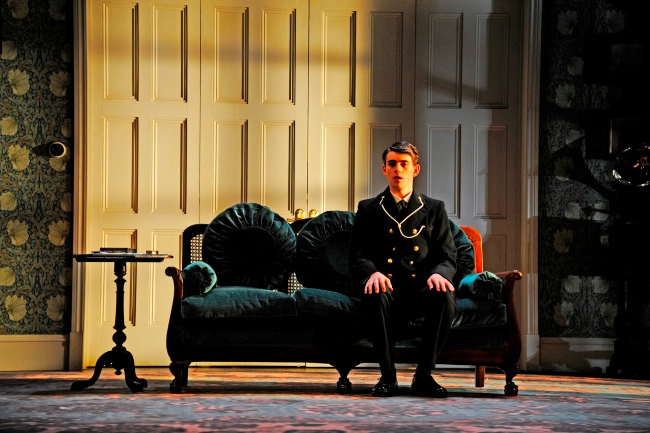 Charlie Rowe as Ronnie Winslow | Photo: Nobby Clark
Charlie Rowe as Ronnie Winslow | Photo: Nobby Clark
Terence Rattigan’s famous play, about a father’s fight for justice for his son, was first staged in London in 1946; and Lindsay Posner’s production at the Old Vic makes you feel you’ve seen it as it might have been presented then. It has a consciously old-fashioned aesthetic, with strong performances in, I thought, a studiedly stilted style. Ian Shuttleworth in the FT called it arid. I thought it more interesting.
The thirteen year old Ronnie Winslow is “sacked” from his naval college for stealing a £5 postal order. But the boy’s been treated unfairly, his stern father thinks. So Arthur Winslow takes on the might of the Admiralty, backed by his suffragette daughter Kate and his barrister, Sir Robert Morton KC.
Henry Goodman is, as you might expect, strong as Arthur Winslow – his performance is the most naturalistic by contemporary standards (or “organic”, to use Ian Shuttleworth’s word), showing the doubt and emotionalism of the man beneath the social and paternal surface. The part runs out of steam slightly towards the end, though, as Arthur’s energy wanes.
I was most interested by the lawyers, of course. Jay Villiers is outstanding as the solicitor Desmond Curry, giving a movingly tragicomic portrait of a man whose achievements are overshadowed by one great disappointment. He, like Winslow, carries his emotional grief as a wound. But the famous role is that of Sir Robert Morton, a strange, forbidding silk, and Tory politician. Peter Sullivan is positively repellent in the role, flooding the stage with a harsh, cold torchlight. I mean this as a compliment to a fine performance.
The play’s most famous scene is Morton’s cross-examination of “the Boy”, and Sullivan’s is more brutal than the cinematic ones I’ve seen, by Robert Donat, in 1948, and Jeremy Northam in 1999 – its closing line bringing the curtain down most dramatically for the interval. We’re told of, not shown, the hint of humanity under Morton’s cold exterior (except, perhaps, in the subtle respect and admiration Morton shows for Winslow père as the two men bond over whisky and soda). But this is a strength. In this production, Kate Winslow’s reaction to the “fish-like” Morton fully makes sense. His professional conduct threat against Curry is especially nasty.
The play’s terrifically Tory in sentiment. Winslow’s no radical. What moves him is a feeling of injustice by the state, the “new despotism” of Whitehall bureaucracy that A.V. Dicey had written about early in the twentieth century, and what seems to Winslow a breach of Magna Carta. It’s an attitude often seen today among “civil liberties” Tories, many of whom would support, red-faced, Winslow’s petition of right – but who’d loathe its modern counterpart, judicial review. It’s interesting that only Kate sees the cause in terms of human rights.
While its social and moral interest in men is deep, women aren’t for the most part taken seriously in this play. The silly woman journalist is especially hard to find funny in 2013. To be fair to Rattigan, Grace Winslow (Deborah Findlay) is given important lines about pride – lines that go to the emotional heart of the play, and which ask serious questions of anyone who’s ever claimed to fight in the name of “justice”. What’s more, Kate Winslow is portrayed both seriously and sympathetically – and Naomi Frederick fills the role well.
In a way, we today see the whole action from Kate’s point of view, and this perhaps shows Rattigan’s sympathies as wider than first appear. The final scene is built on the dramatic irony that we know Kate’s cause will triumph over Morton. More impressively, while he clearly admires the unbendingly repressed and righteous Morton, Rattigan seems through Kate to see what “freedom Toryism” looks like to social democrats: magnifique and magnanimous yet Quixotic and contradictory, selective and sentimental.
For anyone interested in law and the English, The Winslow Boy is an essential play. Its contemporary relevance is brought out all the more strongly by this deliberately “retro” production.
Carl Gardner2013-03-22T21:17:21+00:00
Leave a comment